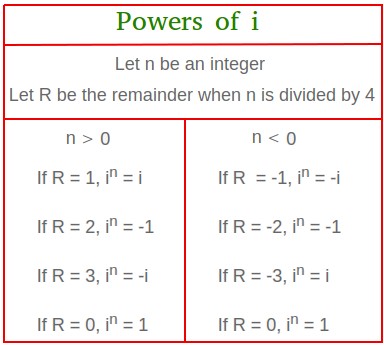Find the powers of i
The powers of i ( in ) are shown in the table below and these can be computed quite easily when n > 0 and n < 0.

If you did not quite understand the information in the table, keep reading to see the logic behind it!
Powers of i when n > 0
i1 = i
i2 = - 1
i3 = i2 × i = -i
i4 = i2 × i2 = 1
i5 = i4 × i = i
i6 = i4 × i2 = -1
i7 = i4 × i3 = -i
i8 = i4 × i4 = 1
Notice the pattern i, -1, -i, 1, ... repeats after the first four complex numbers. In general, if n is an integer bigger than zero, the value of in can be found by dividing n by 4 and examining the remainder.
Did you make the following observations about the powers of i?
- For i4 and i8, the remainder is 0 when we divide 4 and 8 by 4.
- For i3 and i7, the remainder is 3 when we divide 3 and 7 by 4.
- For i2 and i6, the remainder is 2 when we divide 2 and 6 by 4.
- For i1 and i5, the remainder is 1 when we divide 1 and 5 by 4.
Conclusion
Let n > 0 and R is the remainder when n is divided by 4
If R = 1, in = i
If R = 2, in = -1
If R = 3, in = -i
If R = 0, in = 1
Powers of i when n < 0
i-1 = 1 / i = (1 × i) / (i × i) = i / i2 = i / -1 = -i
i-2 = 1 / i2 = 1 / -1 = -1
i-3 = 1 / i3 = 1 / -i = (1 × i) / (-i × i) = i / 1 = i
i-4 = 1 / i4 = 1 / 1 = 1
i-5 = 1 / i5 = 1 / i = -i
i-6 = 1 / i6 = 1 / -1 = -1
i-7 = 1 / i7 = 1 / -i = i
i-8 = 1 / i8 = 1 / 1 = 1
i-1 =-i
i-2 = -1
i-3 = i
i-4 = 1
i-5 =-i
i-6 = -1
i-7 = i
i-8 = 1
Notice the pattern -i, -1, i, 1, ... repeats after the first four complex numbers. In general, if n is an integer smaller than zero, the value of in can be found by dividing n by 4 and examining the remainder.
Did you make the following observations about the powers of i?
- For i-4 and i-8, the remainder is 0 when we divide 4 and 8 by 4.
- For i-3 and i-7, the remainder is -3 when we divide -3 and -7 by 4.
- For i-2 and i-6, the remainder is -2 when we divide -2 and -6 by 4.
- For i-1 and i-5, the remainder is -1 when we divide 1 and 5 by 4.
Conclusion
Let n < 0 and R is the remainder when n is divided by 4
If R = -1, in = -i
If R = -2, in = -1
If R = -3, in = i
If R = 0, in = 1
A few examples showing how to find the powers of i.
Example #1:
i67
67 divided 4 gives a remainder of 3. Since n is positive, i67 = -i
Example #2:
i-67
-67 divided 4 gives a remainder of -3. Since n is negative, i-67 = i
Example #3:
i36
36 divided 4 gives a remainder of 0. Since n is positive, i36 = 1
Example #4:
i-36
-36 divided 4 gives a remainder of 0. Since n is negative, i-36 = 1